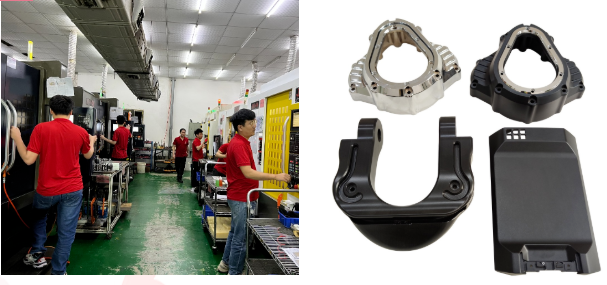 Part Machining / Mould
Part Machining / Mould Sheet Metal / Hand Plate
Customize&Volume Production
 English
English
 Part Machining / Mould
Part Machining / Mould  English
English

CNC machining for small-batch production

In the current context where the demand for flexible production in the manufacturing industry is surging, CNC machining for small-batch production has become a core business scenario for many enterprises. It can not only respond quickly to customized orders but also reduce inventory pressure, perfectly meeting market pain points such as new product development and niche demands. However, small-batch production also faces practical challenges: frequent line changes lead to time-consuming debugging, scattered orders increase management costs, and the lack of batch advantages keeps unit costs high.
The production process of CNC machining

The production process of CNC machining is centered on precise planning, with each step closely linked and highly efficient and controllable. First, complete the programming based on the product drawings, input the processing parameters, paths and other instructions into the system, and lay the foundation for the operation of the machine tool. Subsequently, the raw materials are clamped and positioned, and the workpieces are fixed by fixtures to ensure the accuracy of the processing reference. The core processing stage is automatically operated by the machine tool according to the preset program, completing processes such as milling, drilling, and turning, achieving high-precision cutting throughout the entire process. After processing, it must undergo strict quality inspection to check indicators such as size and precision. Only qualified workpieces can proceed to subsequent finishing steps such as grinding and cleaning. The entire process combines the advantages of automation with standardized norms, ensuring the stability of product quality.
The future development of CNC machining

The future of CNC machining will deeply integrate cutting-edge technologies and move towards new heights of intelligence, greenness and collaboration. The empowerment of artificial intelligence and big data enables equipment to have adaptive adjustment capabilities, allowing for real-time optimization of processing strategies. The Internet of Things (iot) and digital twin technologies break down equipment silos, enabling full-process visualization and remote control of production. Meanwhile, green processes such as dry cutting and waste recycling have been popularized, taking into account both efficiency and environmental protection. The wide application of collaborative robots and the cross-border collaboration of technologies such as 3D printing further enhance production flexibility and meet customized demands. In the future, CNC machining will become the core support for the digital transformation of the manufacturing industry and will unleash greater value in fields such as aerospace and electronics. Industrial People Rapid Prototyping Technology Co., Ltd. is at your service 24 hours a day! Welcome to consult!
